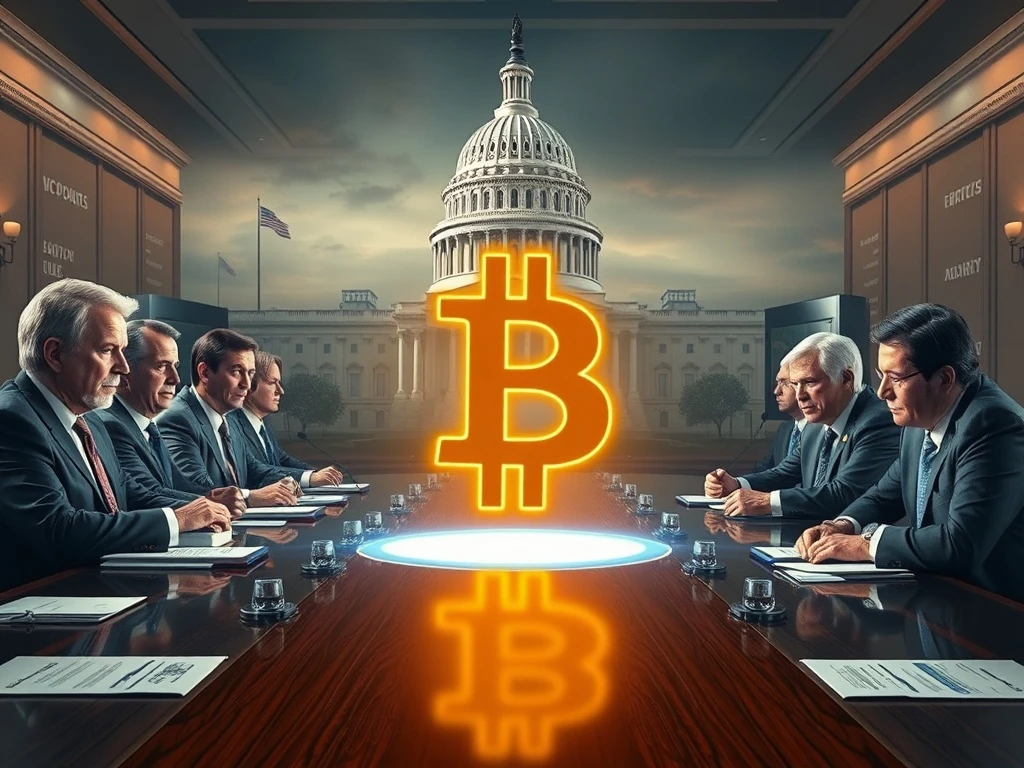Bitcoin Reserve Bill: Crucial Progress as US Lawmakers Tap Industry Titans

The potential for a national **Bitcoin Reserve Bill** in the United States recently took a significant step forward. US lawmakers are actively engaging key industry leaders. This engagement marks a pivotal moment for the nation’s **US Bitcoin Strategy**. Esteemed figures like Michael Saylor and Tom Lee are at the forefront of these crucial discussions. Their expertise aims to advance the Strategic Bitcoin Reserve. This initiative seeks budget-neutral methods to acquire Bitcoin.
Driving the Bitcoin Reserve Bill Forward
US lawmakers met with 18 prominent crypto industry executives. This roundtable discussion took place on Tuesday. Its primary goal was to explore how Congress can move forward with President Donald Trump’s Strategic Bitcoin Reserve. Key attendees included MicroStrategy Chairman **Michael Saylor Bitcoin** advocate and Fundstrat CEO Tom Lee. Lee also chairs BitMine. MARA CEO Fred Thiel also participated. The Digital Chambers, a crypto advocacy group, organized this significant event. They shared the full list of participants.
These industry leaders aim to build momentum for the **BITCOIN Act**. Senator Cynthia Lummis introduced this bill in March. The Act proposes that the government acquire one million Bitcoin (BTC) over five years. The Federal Reserve and Department of the Treasury would fund these purchases. President Trump’s executive order insists on budget-neutral financing strategies. The Digital Chambers and its affiliate, The Digital Power Network, hosted this important roundtable.
Understanding the BITCOIN Act’s Vision
The **BITCOIN Act** represents a bold vision for national financial security. It outlines a clear path for the US government. The plan involves strategic Bitcoin accumulation. This would establish a significant digital asset reserve. Lawmakers view this as the next major focus for **Crypto Legislation US**. It follows previous efforts, such as the GENIUS Act stablecoin bill passed in July. The proposed reserve could bolster the nation’s economic resilience. It also aims to secure a competitive edge in the global digital economy.
Industry executives presented various ideas. They focused on funding these Bitcoin purchases without impacting taxpayers. The Digital Chambers emphasized this point. “The focus will be on ensuring the Strategic Bitcoin Reserve is advanced in a budget-neutral way,” they stated. They also aim to “build the coalition needed to move the BITCOIN Act forward.” This collaborative approach is vital. It seeks broad support for the bill’s passage.
Budget-Neutral Funding: A Core Challenge for US Bitcoin Strategy
Funding the Strategic Bitcoin Reserve without burdening taxpayers presents a key challenge. Several budget-neutral strategies have emerged. One proposal involves reevaluating the Treasury’s gold certificates. Another suggests utilizing tariff revenue. These ideas offer innovative solutions. They aim to make the Bitcoin acquisition financially viable. The roundtable also sought answers. Participants wanted to know what has stalled the **BITCOIN Act** for six months. They also aimed to identify the biggest objections from lawmakers. Understanding these hurdles is essential for progress.
This strategic approach mirrors historical precedents. Nations often hold gold as a reserve asset. A Bitcoin reserve could offer similar benefits. It provides diversification and a hedge against inflation. Furthermore, it positions the US at the forefront of digital asset adoption. The discussions explored how a digital reserve could complement existing financial frameworks. This innovative thinking is crucial for modernizing national economic policy.
Key Players Shaping Crypto Legislation US
The roundtable brought together a diverse group of experts. Several Bitcoin mining executives attended. These included CleanSpark’s Matt Schultz and Margeaux Plaisted. MARA’s Jayson Browder and Bitdeer’s Haris Basit also participated. Their insights into the operational aspects of Bitcoin are invaluable. Executives from crypto-focused venture capital firms were present. Off the Chain Capital and Reserve One shared their perspectives. Andrew McCormick, head of eToro’s US business, also contributed.
Traditional finance (TradFi) representatives also took a seat. Western Alliance Bank’s David Fragale and Blue Square Wealth’s Jay Bluestine offered their expertise. This broad representation highlights the widespread interest. It also shows the complex nature of **Crypto Legislation US**. Such diverse input helps create a robust and well-considered bill. It addresses concerns from multiple sectors. This collaboration is vital for effective policy-making.
The Future of a US Bitcoin Reserve
The establishment of a US Bitcoin Reserve carries significant implications. It could enhance national security. It may also strengthen financial stability. Samson Mow, a prominent author, warns against delay. He states that the US risks being “front run” by other nations. These nations could establish their own Bitcoin reserves first. Such a scenario would diminish the US’s strategic advantage. Therefore, timely action on the **Bitcoin Reserve Bill** is critical.
The ongoing dialogue between lawmakers and industry leaders is promising. It signals a serious commitment to exploring Bitcoin’s role in national strategy. The insights gathered from this roundtable will inform future legislative efforts. Ultimately, the success of the **BITCOIN Act** depends on continued collaboration. It also requires finding common ground on budget-neutral funding. The path to a Strategic Bitcoin Reserve is complex, but the discussions show determined progress.








